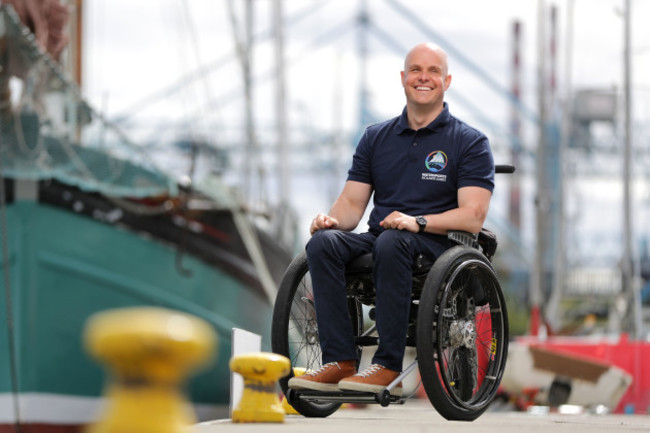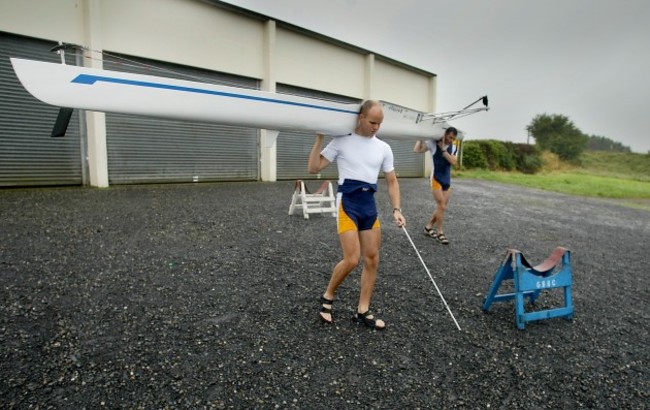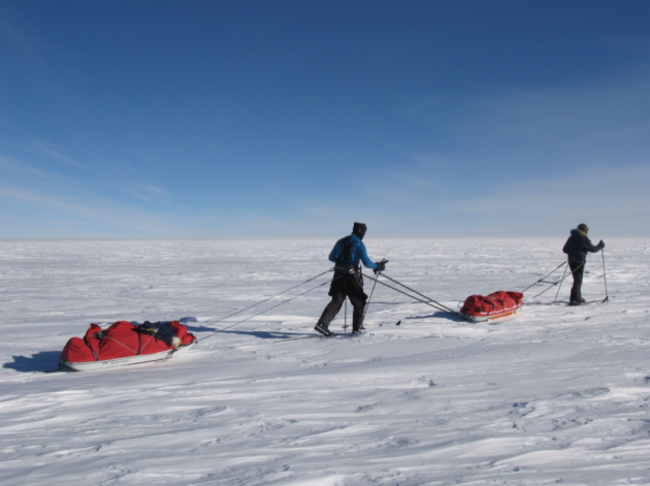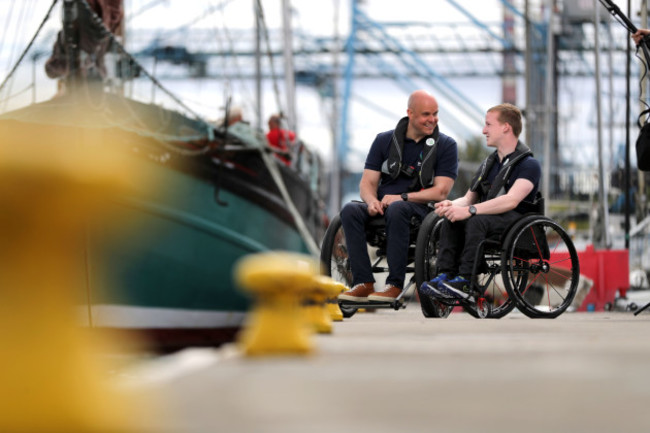“I’M STANDING THERE, my hips are forward and the physios were blocking my knees. He pushes the knees back and I drive my hips forward.
“With the electrical simulator turned on and me trying to straighten my legs, my hips went forward and my knees came back and I’m in the standing position.
“Because I can’t see it or feel it, I needed the guy in front of me to say ‘I’m not holding, I’m not holding.’ As unusual as it was for me, the guy holding my knees was really nervous that I was just going to collapse.”
10 November 2015. Mark Pollock remembers, as clear as day, the first time he stood unassisted since the accident which left him paralysed from the waist down in 2010.
***
Many people may be aware of his story, but if you aren’t here’s a quick run-through.
Pollock has said before that the present is almost like his third life. The first was his life before he lost his sight, the second was after blindness and before paralysis, and the third is now — dealing with both blindness and paralysis.
Born in Belfast, he was a talented rower and sailor growing up, but always had problems with his sight.
“I wasn’t allowed to pick up a contact sport so sailing and rowing were originally what I did whenever I could see and walk,” he tells The42.
Aged 22 and coming towards the end of his time in Trinity College Dublin, over a period of two weeks, Pollock lost his sight. His vision started to go blurry, and his left retina became detached. He went through various operations and procedures, but nothing could be done.
In a matter of days, his world was turned upside down.
“When you acquire a disability, everything changes. Everything.
“When I went blind, I didn’t have a watch. When I opened my eyes, I didn’t know if it was night or day, I couldn’t tell what time it was. You can’t leave the house on your own.
“Everything is new, from telling the time to the way you find your clothes to put on in the morning, to how you move about the house and then outside.
“Everything was different, and I spent those years after blindness trying to just rebuild my identity — which was to go and get a job, to study, and more particularly, to go back rowing.
“Getting back into rowing — it took three years to — that was the big change where I really felt like I was confident again, that I was competing again. It’s probably the other way around. Through the competition was where I gathered my confidence again.”
He picked himself up, dusted himself off and got on with life.
Pollock won silver and bronze rowing medals at the 2002 Commonwealth Games. He recalls how he kayaked across the Irish Sea, did the Round Ireland Yacht Race and took part in the North Pole Marathon.
In 2009, to mark the 10th anniversary of his blindness, he completed one of the biggest adventures possible and became the first blind man to reach the South Pole.
“All of those were races, and had a competitive element to it which is where I felt at home,” he smiles.
Then came July 2010. And his life took another incredulous turn.
Just weeks before his wedding, Pollock fell through a second-story window onto a patio, and critically damaged his spinal cord. He was left paralysed from the waist down, and subsequently, a wheelchair user.
“I’m certainly getting a chance to learn how to deal with challenges,” he laughs, his remarkable positivity shining through. “I’m getting good at it now it would seem.
“I go back to the days when I was 12, 13 and 14, rowing on the Lagan River in Belfast or sailing around, club racing on the Belfast Lough in my boat, and you learn through sport how to win.
“You learn how to succeed. And you also learn what it feels like to fail, and be beaten. You learn that neither success nor failure defines you for the rest of your life. You just go back to training, learn from it and move on, whether it’s a win or a loss.
“I think, in fact, the way I faced up to my blindness, and ultimately faced up to my paralysis, was just replicating what I’d learned on the water as a rower and a sailor.
“Acknowledge that it’s there, acknowledge that that’s the challenge and then decide what you’re going to do about it.”
And that, in a nutshell, is what he has done. And here he finds himself in his third life.
***
After the fall, his friends started a fundraising campaign and set up the Mark Pollock Trust. After a long, and excruciatingly difficult 18 months in hospital, Pollock himself weighed in on the initiative.
He took the reins, and now the end-goal is to find a cure for spinal cord injuries.
“It simply requires enough of the right people having the will to make it happen,” the website reads. “It is our mission to find and connect those people worldwide to fast-track a cure for paralysis. Here’s how: science, speaking and running events.”
For quite some time, work was being split between Ireland and the States. Pollock was overseeing most of the research, and it’s been successful for him — he’s now able to voluntarily move his legs, with the aid of robotics and electrical stimulation.
The next step is scalability.
“It’s been me creating the collaborations and doing the experiments, into the unknown, the exploration around the cure,” he continues. “That has brought us to bring the robotic legs in but spend time in the States.
“But now we’ve got a scientist in Ireland, we’ve got the robotic legs here in Ireland, we’ve got the electrical stimulation here in Ireland and we’ve created that collaboration with Dublin and a couple of companies.
“So now, we’ve got that in place, what we want to do now is scale that research up beyond what I’ve been doing because I can now voluntarily move my legs as I walk on the robot.
“The aim is always to find good research, put collaborations together and then get it out of the research to the clinic as soon as we can. The next step on that is to have a multiple subject study, replicating what I’ve been doing. The way science works, one person isn’t enough.”
Recent findings from research involving both paralysed and able-bodied people in Trinity College have given the 41-year-old great hope in reaching his aim of walking again.
“Regardless of whether it was paralysed people or able-bodied people, the lower the body fat, the better the electrical stimulation seems to work
“The way I’m thinking about it now is I’m an injured athlete — I used to do my rowing plus outdoor stuff, and all the other stuff I used to do — I’m paralysed and trying to walk again, that’s the new goal.
“In order to do that, I have to be electrically stimulated and walk on a robot. In the effort to concentrate on the paralysed bits, I kind of undervalued the health of the upper part of my body and my diet.
“Scientists have said with the results they’re finding the lower the body fat, the better, so I’m hand-biking five times a week. I’m working with someone in South Africa who I email my food diary to a couple of times a week, it’s around the real meal revolution which is a high fat, low carb diet.
“I’ve kind of got the three blocks — the diet and nutrition part to lower the body fat, cardiovascular part for the upper body to make sure that stays in good nick and all of that feeds in to the goal — walking again.
“It’s electrical stimulation and robotics at the moment, but we’ll add in other interventions as they appear.
“It’s much easier to approach this like I would have approached any other race. Now that I’m injured, I should be even better with my nutrition, I should be even fitter than I was before and all of that should feed into the ultimate goal of walking again.”
He casts his mind back to that day, where he stood unassisted, for the first time in over five years. He had been working hard in hospital, trying to move his legs, and then moving into the standing position with the help of his physiotherapist and the robotics.
“I’d been doing that for years but then, we added the electrical stimulation in and instead of it being a mechanical thing, they turned the stimulation on on me. It’s not muscles that are being stimulated, it’s the spine that’s being stimulated.
“In the history of spinal cord research, that is huge. They haven’t been able to do that until the last two or three years, anywhere around the world.
“It happens, and then you think ‘Where can this get to?’ Every time we get a little win like that, you think ‘Well, this is an interesting start, where can it get to?’ It was dramatic, and it was a big win, but it’s very much at the start of the process.
In terms of the present, between his own training, and his work, ‘there’s plenty happening.’
Pollock’s third life, as he puts it, is very different to the former two. Sport, although it may not be from the same perspective, is still a huge component though. And will continue to be until he reaches that end goal.
“It’s different now, with hand-biking, the diet, electrical stimulation and the walking.
“It’s not out and out competition but I’m going to the gym every day, turning up over months and what will turn out to be years, and drawing from everything I learned in sport.”
Mark Pollock launches the Watersports Inclusion Games, a free event organised by the Irish Sailing Association in Dun Laoghaire on 24th & 25th June to allow people of all ages and abilities to try sailing, rowing and canoeing. Accompanying Mark is Nadine Lattimore, London 2012 Paralympic athlete, and Oisin Putt, member of the Sailability Paralympic Pathway Team. For more information see www.sailing.ie/watersportsinclusiongames.




